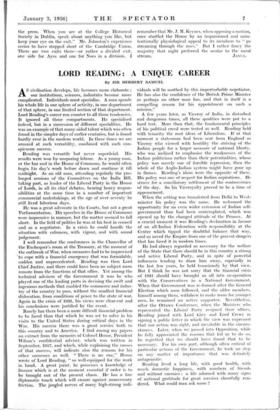LORD READING: A UNIQUE CAREER
By SIR HERBERT SAMUEL Reading was versatile but never superficial. His results were won by unsparing labour. As a young man, at the bar and in the House of Commons, he would often begin Lis day's work before dawn and continue it till midnight. As an old man, attending regularly the pro- longed sessions of the Committees on the India Bill, taking part, as leader of the Liberal Party in the House of Lords, in all its chief debates, bearing heavy respon- sibilities at the same time in a number of important commercial undertakings, at the age of over seventy he -still lived laborious days.
He was a great advocate in the Courts, but not a great Parliamentarian. His speeches in the House of Commons were impressive in manner, but the matter seemed to fall short. In the field of politics he was at his best in council and as a negotiator. In a crisis he could handle the situation with calmness, with vigour, and with sound judgement.
I well remember the conferences in the Chancellor of the Exchequer's room at the Treasury, at the moment of the outbreak of War, when measures had to be improvised to cope with a financial emergency that was formidable, sudden and unprecedented. Reading was then Lord Chief Justice, and there could have been no subject more remote from the functions of that office. Yet among the technical advisers of the Government it was he who played one of the leading parts in devising the swift and ingenious methods that enabled the commerce and indus- try of the country to pass, without the smallest financial dislocation, from conditions of peace to the state of war. Again in the crisis of 1931, his views were clear-cut and his conclusions were justified by the event.
Rarely has there been a more difficult financial problem to be faced than that which he was set to solve in his visits to the United States during critical days in the War. His success there was a great service both to this country and to America. I find among my papers an extract from the memoirs of Colonel House, President Wilson's confidential adviser, which was written in September, 1917, and which, while explaining the causes of that success, will indicate also the reasons for his other successes as well. "There is no one," House wrote of Lord Reading, "so well-equipped for the work in hand. A great jurist, he possesses a knowledge of finance which is at the moment essential if order is to be brought out of the present chaos. He has a fine diplomatic touch which will' ensure against unnecessary friction. The jangled nerves of many high-strung indi- viduals will be soothed by this imperturbable negotiator. He has also the confidence of the British Prime Minister as perhaps no other man has, and that in itself is a compelling reason for his appointment on such a mission."
A few years later, as Viceroy of India, in disturbed and dangerous times, all these qualities were put to a hard test. More than that, the fundamental principles of his political creed were tested as well. Reading held with tenacity the root ideas of Liberalism. If at that moment a statesman had been sent from England as Viceroy who viewed with hostility the striving of the Indian people for a larger measure of national liberty, who was inclined to emphasise the weaknesses of the Indian politicians rather than their potentialities, whose policy was merely one of forcible repression, then the whole of the Anglo-Indian system might have gone up in flames. Reading's ideas were the opposite of these. His policy was one of respect for Indian aspirations. He strove for a conciliatory settlement of the controversies of the day. So his Viceroyalty proved to be a time of appeasement.
When the setting was transferred from Delhi to West- minster his policy was the same. He welcomed the opportunity for an even wider extension of Indian self- government than had been contemplated, which was opened up by the changed attitude of the Princes. At a crucial moment it was Reading's declaration in favour of an all-Indian Federation with responsibility at the Centre which tipped the doubtful balance that way, and so saved the Empire from one of the gravest dangers that has faced it in modern times.
He had always regarded as necessary for the welfare of the State that there should be in this country a strong and active Liberal Party, and in spite of powerful influences tending to draw him away, especially in the last few years, he held tenaciously by that view. But I think he was not sorry that the financial crisis of 1931 should have brought us all into co-operation with the Conservatives in a National Government. When that Government was re-formed after the General Election which soon followed, and the older members, himself among them, withdrew to make room for younger men, he remained an active supporter. Nevertheless, after the Ottawa Conference, when the Ministers who represented the Liberal Party resigned their offices, Reading joined with Lord Grey and Lord Crewe in signing a public letter in which the view was expressed that our action was right, and inevitable in the circum- stances. Later, when we passed into Opposition, while he fully appreciated the reasons that led us to do so, he regretted that we should have found that to be necessary. For his own part, although often critical of particular actions of the Government, he took no step on any matter of importance that was definitely antagonistic.
Reading lived a long life, with good health, with much domestic happiness, with numbers of friends and without enemies : a life adorned with many signs of national gratitude for great services cheerfully ren, dered. What could man ask more ?










































 Previous page
Previous page